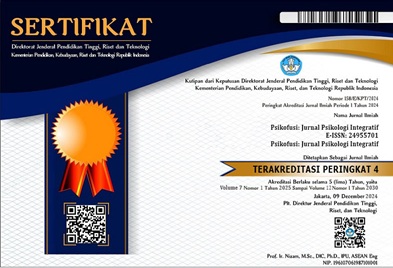HUBUNGAN ANTARA QUARTER LIFE CRISIS DENGAN SUBJECTIVE WELL-BEING PADA GENERASI Z
Kata Kunci:
Quarter Life Crisis, Subjective Well-Being, Generasi Z, Dewasa AwalAbstrak
Penelitian ini bertujuan untuk mengetahui hubungan antara quarter life crisis dengan subjective well-being pada generasi Z yang berada dalam rentang usia 20–30 tahun. Quarter life crisis merupakan kondisi psikologis yang ditandai dengan kebingungan, kecemasan, dan ketidakpastian mengenai arah hidup, sementara subjective well-being mencerminkan evaluasi individu terhadap kualitas hidupnya secara kognitif dan afektif. Penelitian ini menggunakan pendekatan kuantitatif dengan desain korelasional. Sampel penelitian berjumlah 193 responden yang dipilih menggunakan teknik accidental sampling. Alat ukur yang digunakan berupa skala quarter life crisis dan skala subjective well-being yang telah diuji validitas dan reliabilitasnya. Analisis data dilakukan menggunakan uji korelasi Pearson Product Moment. Hasil penelitian menunjukkan adanya hubungan negatif yang signifikan antara quarter life crisis dan subjective well-being (r = -0,412, p < 0,01). Artinya, semakin tinggi tingkat quarter life crisis yang dialami individu, maka semakin rendah tingkat subjective well-being-nya, dan sebaliknya.
This study aims to determine the relationship between quarter life crisis and subjective well-being in generation Z who are in the age range of 20-30 years. Quarter life crisis is a psychological condition characterized by confusion, anxiety, and uncertainty about the direction of life, while subjective well-being reflects an individual's evaluation of his or her quality of life cognitively and affectively. This study uses a quantitative approach with a correlational design. The research sample amounted to 193 respondents selected using accidental sampling technique. The measuring instruments used are the quarter life crisis scale and the subjective well-being scale which have been tested for validity and reliability. Data analysis was carried out using the Pearson Product Moment correlation test. The results showed a significant negative relationship between quarter life crisis and subjective well-being (r = -0.412, p < 0.01). That is, the higher the level of quarter life crisis experienced by individuals, the lower the level of subjective well-being, and vice versa.





